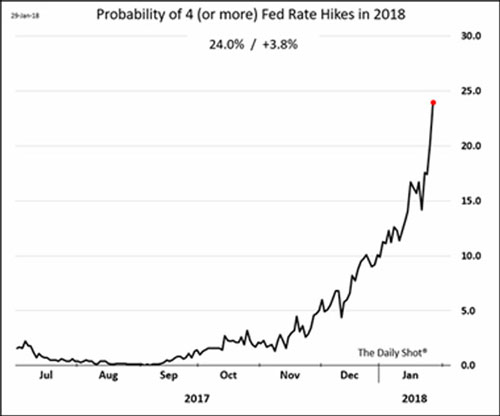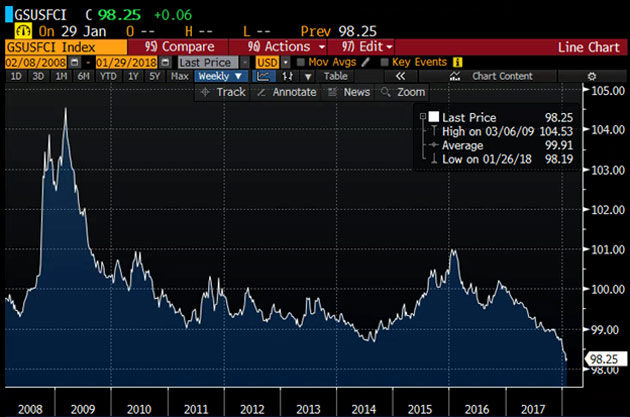| -- | February 1, 2018 There Won’t Be Three Rate Hikes This Year  Now would be a good time to follow me on Twitter if you haven’t already, because stuff is about to get real. I was finger-scrolling through The Daily Shot the other day (a daily chart package mailed out by The Wall Street Journal—it’s a must-read for everyone in the business), and I came across this: 
Source: The Daily Shot People are getting bulled up on the idea that the Fed might hike more than three times this year. That’s not unreasonable, given that stocks have gone straight up and financial conditions are the easiest they’ve been… ever. I hereby present a chart of the GS Financial Conditions Index. 
Source: Bloomberg Note: an increase in the FCI is evidence of a tightening of financial conditions, and a decrease indicates easing. Lots of folks (like me) have been telling the Fed to take away the punchbowl. We have bubbles everywhere and we still have negative real interest rates. Who knows, maybe they will finally listen! But people have a high degree of certainty about the future path of interest rates at a time when they should have the highest degree of uncertainty about the future path of interest rates. Why? Because we have a new Fed Chairman, of course. It is possible that we will have more than three rate hikes this year. It is also possible that we will have less than three rate hikes this year. It is possible that we have zero. It is possible that we have rate cuts. Markets being what they are, I will tell you one thing for sure: I don’t know how many rate hikes we have this year, but it probably won’t be three. Interest Rate Probabilities Right now, the market is implying an 84.3% chance that we will have two, three, or four rate hikes in 2018, according to Bloomberg calculations based on Fed Funds futures. That is a high degree of certainty. People are making a lot of assumptions about the Fed: - People are assuming Jay Powell will be the exact same Fed Chair as Janet Yellen.
- People are assuming the future composition of the Board of Governors will be hawkish.
- People are assuming the volatility of inflation remains low.
- People are assuming tax reform will lead to growth.
- People are assuming the probability of a recession is low.
- People are assuming the best of Trump.
Point is: anything can happen. Powell could rip rates, or the Dow could puke 500 points about a dozen more times, the economic data could roll over, and we could be talking about rate cuts. Twenty years ago, the Fed was a source of volatility. Intermeeting rate moves, 50bp moves all over the place. Now, the Fed is a source of stability. What if stability turns into volatility… monetary policy suddenly becomes unpredictable… forward guidance stops, or becomes faulty? Should the Fed be a source of volatility? In a Fed-free world, there would probably be lots of volatility in the market for short-term interest rates. By suppressing that volatility, is the Fed doing anyone any favors? It’s leading people to believe that the world is less threatening than it actually is. Do you think people can be encouraged to take risks that they otherwise wouldn’t? My Personal Opinion My personal opinion is that the Fed will hike less than three times (could be zero) and the best-performing asset of 2018 will be short-term bonds. It might be the only performing asset of 2018, because there is no place to hide anywhere else. We saw that on Tuesday—stocks and bonds both down. That is because stocks and bonds are both overpriced, which I’ve said a million times before. The market is nothing if not filled with irony. These days, people aren’t satisfied with anything less than 50,000% on some alt-coin. The irony is that a total return of 4% on short-term bonds (2% income, 2% capital gains) might be a home run year in 2018. I don’t think two year notes are on anyone’s list of top picks this year. One more fearless forecast: this might be the first time in maybe forever that we have a bear market, and a recession, without the yield curve inverting. The curve has actually been steepening a bit, which I speculate is mostly due to supply. We run bigger deficits + the Fed chickens out = it is going to be really hard to invert the yield curve. Sometimes bull markets just get old and die. It would probably be a good idea to enter this year with lowered expectations. Sharply. What we had last year was investor Nirvana. If you caught it, good for you. I would not try to repeat the experience this year. 
Jared Dillian
Editor, The 10th Man
 | Get Thought-Provoking Contrarian Insights from Jared Dillian
Meet Jared Dillian, former Wall Street trader, fearless contrarian, and maybe the most original investment analyst and writer today. His weekly newsletter, The 10th Man, will not just make you a better investor—it's also truly addictive. Get it free in your inbox every Thursday. |
Jared's premium investment service, Street Freak, is available now. Click here for our introductory offer. Jared Dillian, former head of ETF Trading at one of the biggest Wall Street firms and author of the highly acclaimed books, Street Freak: Money and Madness at Lehman Brothers , and All the Evil of This World , shows you how to pick and trade trends, and master your inner instincts. Learn how to use “Angry Analytics” as a leading indicator of budding trends you can profit from… and how to view any market situation through the lens of a trader. Jared’s keen insight into market psychology combined with an edgy, provocative voice make Street Freak an investment advisory like no other. Follow Jared on Twitter at @dailydirtnap. Share Your Thoughts on This Article
 http://www.mauldineconomics.com/members
Use of this content, the Mauldin Economics website, and related sites and applications is provided under the Mauldin Economics Terms & Conditions of Use. Unauthorized Disclosure Prohibited The information provided in this publication is private, privileged, and confidential information, licensed for your sole individual use as a subscriber. Mauldin Economics reserves all rights to the content of this publication and related materials. Forwarding, copying, disseminating, or distributing this report in whole or in part, including substantial quotation of any portion the publication or any release of specific investment recommendations, is strictly prohibited.
Participation in such activity is grounds for immediate termination of all subscriptions of registered subscribers deemed to be involved at Mauldin Economics’ sole discretion, may violate the copyright laws of the United States, and may subject the violator to legal prosecution. Mauldin Economics reserves the right to monitor the use of this publication without disclosure by any electronic means it deems necessary and may change those means without notice at any time. If you have received this publication and are not the intended subscriber, please contact service@mauldineconomics.com. Disclaimers The Mauldin Economics website, Yield Shark, Thoughts from the Frontline, Patrick Cox’s Tech Digest, Outside the Box, Over My Shoulder, World Money Analyst, Street Freak, ETF 20/20, Just One Trade, Transformational Technology Alert, Rational Bear, The 10th Man, Connecting the Dots, This Week in Geopolitics, Stray Reflections, and Conversations are published by Mauldin Economics, LLC. Information contained in such publications is obtained from sources believed to be reliable, but its accuracy cannot be guaranteed. The information contained in such publications is not intended to constitute individual investment advice and is not designed to meet your personal financial situation. The opinions expressed in such publications are those of the publisher and are subject to change without notice. The information in such publications may become outdated and there is no obligation to update any such information. You are advised to discuss with your financial advisers your investment options and whether any investment is suitable for your specific needs prior to making any investments.
John Mauldin, Mauldin Economics, LLC and other entities in which he has an interest, employees, officers, family, and associates may from time to time have positions in the securities or commodities covered in these publications or web site. Corporate policies are in effect that attempt to avoid potential conflicts of interest and resolve conflicts of interest that do arise in a timely fashion.
Mauldin Economics, LLC reserves the right to cancel any subscription at any time, and if it does so it will promptly refund to the subscriber the amount of the subscription payment previously received relating to the remaining subscription period. Cancellation of a subscription may result from any unauthorized use or reproduction or rebroadcast of any Mauldin Economics publication or website, any infringement or misappropriation of Mauldin Economics, LLC’s proprietary rights, or any other reason determined in the sole discretion of Mauldin Economics, LLC. Affiliate Notice Mauldin Economics has affiliate agreements in place that may include fee sharing. If you have a website or newsletter and would like to be considered for inclusion in the Mauldin Economics affiliate program, please go to http://affiliates.ggcpublishing.com/. Likewise, from time to time Mauldin Economics may engage in affiliate programs offered by other companies, though corporate policy firmly dictates that such agreements will have no influence on any product or service recommendations, nor alter the pricing that would otherwise be available in absence of such an agreement. As always, it is important that you do your own due diligence before transacting any business with any firm, for any product or service. © Copyright 2018 Mauldin Economics | -- |
